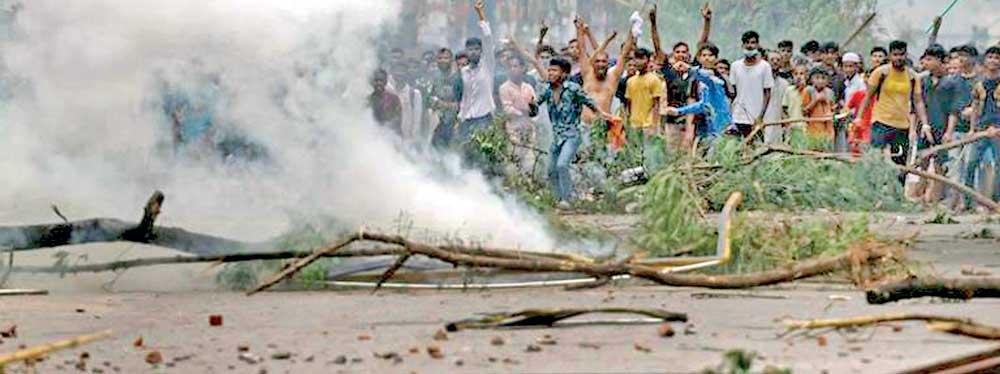Reply To:
Name - Reply Comment


The protests in Bangladesh grew more intense after Sheikh Hasina declined to address the students’ demands, citing ongoing court proceedings (file Photo)
 A week of historic events, both local and international, saw unprecedented street violence in neighboring Bangladesh, causing over 400 deaths and, overshadowing our heroic boys’ unexpected cricket revival, triumphing over the number one team in the world.
A week of historic events, both local and international, saw unprecedented street violence in neighboring Bangladesh, causing over 400 deaths and, overshadowing our heroic boys’ unexpected cricket revival, triumphing over the number one team in the world.
Bangladesh Mayhem
A protest [Aragala?] erupted against a job quota system that reserved 30 percent of government jobs for descendants of war heroes from Bangladesh’s 1971 independence war. Students demanded a merit-based shortlisting of results rather than the quota system, leading to Prime Minister Sheikh Hasina fleeing the country. Following her departure, demonstrators ransacked Hasina’s residence, taking away all valuables. The protests turned violent, as demonstrators clashed with police and pro-government agitators. Among the deceased were hundreds of students aged between 18 and 30, who were beaten by onlookers. With high unemployment, 32 million young people out of a total population of 170 are neither employed nor in education.
The protests grew more intense after Sheikh Hasina declined to address the students’ demands, citing ongoing court proceedings. She branded the opponents of the quota system as “razakar,” a term traditionally used for persons accused of teaming up with the Pakistani army during the 1971 war.
The rioters have caused severe damage to the country’s economy and infrastructure. They have burned religious sites, looted businesses, and attacked democratic institutions, ransacked and destroyed shops and residences of Hindus. As the situation in Bangladesh begins to stabilise, a fresh controversy has emerged in the local political arena. JVP stalwart Lal Kantha has stirred up a storm with a bold and scandalous claim. Addressing tax professionals in the city a week ago, rather than a village meeting, Lal Kantha alleged that the JVP had orchestrated the failed attempt to seize the parliamentary complex in 2022. The former legislator claimed that the JVP had directed the Aragala protesters towards Parliament but ultimately fell short of their goal due to lack of support from other protest leaders. Consequently, they were unable to deliver a decisive blow to the Rajapaksa regime, which managed to reassert its dominance in Parliament.
If the attempt to overrun the Sri Lankan Parliament had succeeded, it would have worsened the chaos and instability, worsening the people’s misery. This would have likely plunged the country into long term political instability and economic distress. How many of the 28 professional units affiliated with the JVP approve of this stance?
Deserting Medamulana
On the local political scene, the staunch Rajapaksa loyalists made the surprising move of discarding the Medamulana ‘Saataka’ in favour of an ‘Independent’ Ranil. This in succession outshined the much-touted “largest Alliance in history” that Sajith loyalists boasted of, which turned out to be a ‘damp squib.’ Despite the fanfare, the anticipated excitement never materialised and ultimately fell flat in disappointment when the same group, who had been living together, finally re-registered the marriage. The only new additions to the so called grand alliance were the expert pole-vaulter Dayasiri and the distinguished politician from the South, Dulles, who had previously failed the Malimava interview.
However, as the week ended, the SJB celebrated a Supreme Court ruling that validated the expulsion of the maverick pair, Harin and Manusha, from the party, resulting in the loss of their Cabinet portfolios and Parliamentary seats. Twenty four hours later in BD the Chief Justice resigned amid widespread student protests calling for judicial reforms.
“Old Wine in New Bottles” ?
The SJB’s Jana Sandhanaya comprised many disgruntled politicians who were left with little hope of gaining entry to Parliament after the fall of the Rajapaksas. In contrast, the JVP’s Peramuna, NPP, consists of 28 apolitical professional bodies whose democratic ways and thinking differ from some controversial seniors in the JVP, such as Lalkantha and Handunetti, who promoted the idea of an undemocratic takeover of Parliament.
Alliance theories largely stem from the experiences of Western European countries, leading to an undue focus on post-election coalitions. This Western-centric perspective does not fully account for the unique political, social, and economic contexts of other regions, where the dynamics of coalition formation and sustainability can differ significantly. Understanding these nuances is crucial for developing more comprehensive theories and strategies that can better address the challenges posed by coalitions and alliances in diverse political environments. The failure of alliances to deliver stability often stems from the conflicting interests and priorities of the involved parties. Smaller parties, which temporarily set aside differences in pursuit of power, and larger parties, which meticulously conceal their true intentions, frequently revert to their original positions once power is consolidated. This reversion leads to internal conflicts and governance issues, ultimately causing political instability and undermining economic growth and investor confidence.
Voters need to avoid selecting bad candidates. This practice undermines the democratic process and erodes public trust. For a fair and credible electoral system, voters and political leaders should uphold high standards of honesty and accountability.
Some SLPP MPs who had shifted their allegiance to the President and opposition leader are either facing allegations or have been pardoned by the courts. [A popular Gampaha District former SLPP economist, now with SJB, was once arrested and remanded for allegations of corrupt practices, but acquitted after eight years due to lack of evidence] the President clarified that he did not obstruct any legal actions against them. He expects the electorate to reject these MPs in the next parliamentary election. The President underscored the importance of both legal processes and the democratic system in addressing the accusations against these MPs, affirming his commitment to transparency and accountability. This does not excuse party leaders from their responsibility; they must ensure they do not nominate individuals with corrupt backgrounds.
Furthermore, the instability caused by fragile coalitions can hinder long-term planning and implementation of economic policies, which are critical for attracting Foreign Direct Investment (FDI) and securing financial support from international institutions. In conclusion, while alliances and coalitions are often formed with the intent of consolidating power and achieving political goals, their inability to provide stable governance poses significant risks to economic and political stability. A more nuanced understanding of coalition dynamics, beyond the Western European experience, is essential for addressing these challenges and fostering more effective and stable political alliances globally.
In a letter to the media, Pavithra explained her decision to support Wickremesinghe. She stated that after discussions with party members, academics, social activists, and other associates, she chose to back Wickremesinghe. The senior politician acknowledged that the SLPP had made Wickremesinghe the President, thereby bringing economic and political stability.
Nobel laureate Mohammed Yunus, 84, was sworn in as the head of the interim government with the support of young radicals. They did not advocate for a younger, inexperienced replacement for Hasina, understanding that political maturity often proves most effective in a similar crisis that Sri Lanka experienced two years ago.